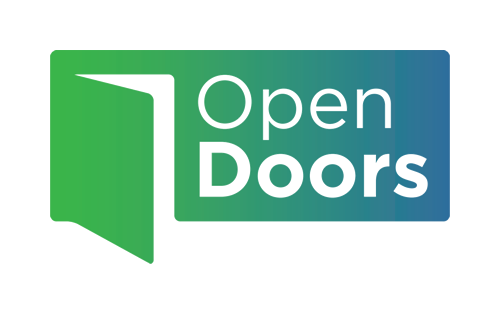News
Leaders Summit: Championing Corporate Social Justice

Business leaders and innovators from around Ireland and beyond, joined us on Thursday 1st February at the House of Lords for the Open Doors Initiative Leaders Summit. We are so grateful to be supported by the Indeed Fund at Community Foundation Ireland (Principal Supporter), Bank of Ireland, Compass Ireland, The Core Story and WHPR. Chaired by the amazing Dearbhail McDonald, we welcomed Simon Coveney TD, Minister for Enterprise, Trade and Employment as our keynote speaker, who shared the importance of responsible business practices to strengthen and sustain the communities in which they operate.
ODI CEO Jeanne McDonagh introduced the principles of Corporate Social Justice and encouraged attendees to lead out in this emerging area, to create change and positive social impact.
Read more about Corporate Social Justice below and get in touch with us on info@opendoorsinitiative.ie.
Corporate Social Justice – Campaigning For Your Values
We are at the cusp of major societal challenges, dealing with a whole range of seismic issues that will affect all our lives.
In Ireland, migration, housing, climate change, socio-economic and political upheaval impact our consumers, employees, friends and family, and wider society. Business has a key role to play in how beneficial change comes about, and can improve how we all live, now, and into the future.
Corporate Social Justice is not about just about giving back to society, or having a social licence to trade. It is about transforming society because the urgent pursuit of economic and social justice – be it the eradication of income inequality, to mass migration issues, to LGBTQ+ rights and other areas – which are the responsibility of us all.
This socially charged world is requiring companies to re-examine their CSR policy. Not only do consumers demand it, but employees do, too.
It’s evolved from corporate social responsibility to corporate social justice, a vital reframing which hones in on the lived experience of people who live on its margins1.
Looking to home, why does a company last and thrive 250 years and beyond? Because great social commitment leads to great business. They made a choice to do social good.
Guinness/Diageo and its long history of social impact, for both employees and the wider community is a story worth sharing.
Social development like the Iveagh Trust and housing for employees and those facing need; the development of Stephens Green and other outdoor spaces for the common good; civic work as Lord Mayor and in other realms of political life; up to present day such as the Guinness Enterprise Centre and the Learning for Life programme to help people into work. They are a company living their values.
Corporate Social Justice is far more than just “giving back” to the community; it’s about taking a stand and bettering the society in which organisations operate.
Companies are not islands with a siloed existence but by dint of operating in a place, their actions cause ripples throughout their communities. It is not just about painting charities walls or making donations or winning awards, as in traditional CSR. It is about a companywide, leader led, holistic approach, committing to positive change in their communities and society in general – from the front door to the top floor.
It goes behind charity work and philanthropy to focus on the experiences of groups disadvantaged by, or worse, harmed by society. It is a way of working, measured by the trust between a company and its employees, customers, shareholders, and the broader community it touches, with the goal of explicitly doing good by all.
Business is Changing and there are indicators of that change -
- CONSCIOUS Capitalism, B Corp, the Corporate Sustainability Reporting Directive, all lead to purpose led companies
- People expect their CEO to lead on social issues
- Business has the capacity to drive Diversity, Equality and Integration initiatives where society has lagged
- Some leadership has failed us – political, financial, religious – there is a lacuna that needs to be filled
All stakeholders need to be catered for in the way we do our business. It needs to be more human centred. It is essential to your bottom line, employee attraction and retention, creative and lateral thinking and to making your company and community better places.
Around half of the 50 largest companies in the Irish economy scored 30% or less in the latest Irish business and human rights benchmark report; published by the Trinity Centre for Social Innovation. However, despite stricter criteria, six companies, including two of our partner companies, ESB and AIB, increased their score by five points or more in the report.
The Government is in the process of developing a second National Action Plan on Business and Human Rights which should be a tangible and ambitious goal for all.
You can make Corporate Social Justice a real positive for your work.
We know that consumers pay close attention to a brand’s social justice efforts before purchasing a product. They want to know what the brands they support are actually doing to address social issues2.
And this is rising.
It is also beneficial for existing employees who thrive in a diverse work environment. Many coming into the workplace now expect their companies to mirror their values and will be attracted to those who do this work for societal good.
Your own company’s purpose and work in these areas needs to be measured and goals set to produce clear outcomes and built on, year on year. It needs to be CEO led and encompass the whole of the business and not just the DEI space or Marketing or HR.
Corporate social justice requires organisations to deeply integrate how they’re behaving internally to how they behave externally, to transform society for the better as they carry out good business.
What does a world with DEI integrated into business looks like? One small example
Madeeha came to the Open Doors Initiative for mentoring and work, as a refugee. We helped her get a position, which she had career progression in and loved the job. She thrived. She became very ill with cancer, and we worked with her through that until she was back in work. We have been part of her marriage, her growing family and her advancement here in Ireland to become a citizen. It has been a holistic approach to the person, and she is only one example of the people who want to make a mark here.
So, what is the Ask?
What legacy do you want your company to leave?
What do you want your time as CEO to be remembered as?
Employees, consumers, suppliers and the wider community will remember those who walked away from social issues and those who remained true. This requires long term commitment, not just a trinket for awards and then to be put back on the shelf, or worse, cut for short term budget reasons.
Companies with authentic values will intensify this work when it is most needed and embed it in their every fibre. It will guide all decision making. It’s about taking a stand on issues and putting your all behind it. Being brave in every aspect of your company from marketing to recruitment to driving change which everyone will benefit from.
It also means getting informed on issues; the understanding of all underlying factors that have come forth such as housing, our own migration history, racism and the rise of the far right.
Real allyship is not meant to be comfortable because the people you are allies to are not comfortable3.
At the Open Doors Initiative, we want Corporate Social justice to be the benchmark for all companies we work with and their activities.
We want leadership in this area both in Ireland and beyond.
So, sign up for the journey as a partner company; talk to us with your leadership team; do great work.
The Open Doors Initiative look forward to aiming for this future with you.
1 - Harvard Business Review, 2020
2 - 2019 survey conducted by Markstein and Certus Insights, US
3 - Gorm Media



